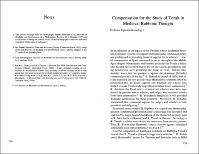Please use this identifier to cite or link to this item:
https://hdl.handle.net/20.500.12202/8563| Title: | Compensation for the study of Torah in medieval rabbinic thought |
| Authors: | Kanarfogel, Ephraim 0000-0002-7539-7802 |
| Keywords: | Andalusian Jewry communal support for judges and scholars Torah scholars |
| Issue Date: | 1989 |
| Publisher: | NY: Peter Lang |
| Citation: | Kanarfogel, E. (1989). |
| Abstract: | As an inheritor of the legacy of the Geonim, whose academies developed extensive systems of support and fundraising, Andalusian Jewry was predisposed to providing financial support for its scholars.1 Jewish communities in Spain continued to do so throughout the Middle Ages, despite Maimonides' well-known position that Torah scholars who decided not to work, but to live on the salaries provided by willing benefactors, were profaning the name of God. Indeed, Maimonides notes that his position is against the dominant [Sefardic] communal practice of his day. 2 R. Shmuel ha-Nagid ( d. 1056) had already endorsed the very practice that Maimonides condemns when he proclaimed that he would support and maintain any scholar who wished to make Torah study his profession (lihyot torato ummanuto).3 R. Avraham ibn Daud refers to important scholars who were supported by patrons and to scholars and judges who received salaries from their communities.4 R. Yehudah h. Barzilai (c. 1100) provided Talmudic justification for these practices. Moreover, R. Yehudah maintained that communal support for judges and scholars is both prevalent and obligatory.5 |
| Description: | Scholarly book chapter |
| URI: | https://hdl.handle.net/20.500.12202/8563 |
| ISBN: | 0820408344 |
| Appears in Collections: | Bernard Revel Graduate School of Jewish Studies (BRGS): Faculty Publications |
Files in This Item:
| File | Description | Size | Format | |
|---|---|---|---|---|
| Ephraim_Kanarfogel_Compensation_for_the Study 135-147.pdf | 1.26 MB | Adobe PDF |  View/Open |
This item is licensed under a Creative Commons License

